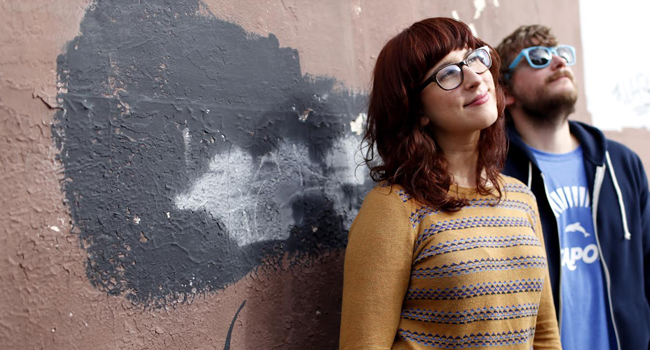The Dandy Warhols’ co-founder, lead singer and guitarist Courtney Taylor-Taylor spoke with Pop’stache Senior Staff Writer Craig Bechtel via phone about their new record, This Machine, which is being released on Tuesday April 24th, about where the record fits into their discography, what makes his group unique and how they keep things fun after 18 years as a band.
Pop’stache: Tell me about the new album and how it differs from your previous releases.
Courtney Taylor-Taylor: They all differ from each other, but this one seems more like our first record…It’s very “what the band does live:” it’s Pete in one guitar, Pete’s guitar over there, my guitar over there, one part each, no doubling, triple tracking. On a couple of the records we would get into like 13, 14 tracks of guitar, a lot of stuff, 140 instruments on a song and then trying to layer and texture them all, so this one was really “rock band.”
P ‘s: Was the recording process kind of “stripped down” compared to how you’ve done it before?
Taylor: Yeah. I would go in and do some stuff for a few days. Other cats would stop in and hang out and if I need something from them they would [pitch in], but everyone took their time getting into the studio and working…and then a lot of alone time and then a long break, whereas it used to be we would all be in there 16 hours a day for 18 months; it was crazy. Weird emotional craziness would occur, and it was just really obsessive. This [record] was the least amount of time I’ve spent in the studio controlling the ball and the least amount I think anyone’s really spent working on it. We really tried to work out our parts more than the recording, and then it was also the only time I haven’t flown out to wherever [producer] Tchad Blake was, to sit with him during the mix. We would always sit with him. So we just left him to mix it, and then make adjustments by email. I would listen back to the mix, and saying can you make this a little less dominant in the mix or that a little more dominant or whatever, and on almost every song I went back to his original mix.
P ‘s: So obviously it worked out well for you this time.
Taylor: Yeah, yeah, it’s great. It also makes the record sound like somebody else’s record, so I get to enjoy it like it’s somebody else’s record. It’s like the band I wish somebody else was, so I could make records that I would just love. And that’s what we’ve always tried to do, but this one, by just giving up control over a lot of stuff that isn’t my parts, God, it’s just fantastic! I can’t believe it. I mean, people out there—there are some really good, really intuitive and talented artists out there, like Tchad, that you just let them do what they do, and then there’s three of them in my band as well, I mean those three people are fucking geniuses, you know? They make amazing shit happen, they’re incredible. So, yeah, I think this is definitely like –it’s definitely the beginning of a different sort of band, or we’ve just come around to the way it was in the beginning, where we just didn’t have the time in the studio back then to fuck around that long, so everyone had to have their parts together before they went in, it was a more minimalist approach, and layering 14 tracks of guitar on our first record was a rarity. We only did it maybe once or twice. We just didn’t have the time, you know?
P ‘s: Yeah, I’ve listened to the new record a few times, and I really love how it sounds. Would you agree with the assessment that it’s more organic than some of the more recent records have been?
Taylor: Oh, yeah it is very similar to Odditorium in that dirt and wood and grime kind of texture, you know? And that’s also Tchad Blake again, mixing. But, certainly more than our last one which is an amazingly cool record, I mean there’s so much great stuff on it, I love it. But it just seemed like we spent too much time on it, to me. Odditorium I think is just an amazing record, maybe my favorite of our records. Probably spends more time in that number one slot of my favorite records than any of our other records, although they all spend a lot of time there, [laughs] now that I think about it. Yeah, obviously [Welcome To The] Monkeyhouse was an experiment in really tight minimalist synthetics. And then Come Down was an experiment in saturation in cloudy, thick shoe-gaziness. And then our first record was just simply to be a band that is simply deeply something, extremely so, you know? I mean I like melodies and I like pretty, but I like it to be as fucked up and dirty as it can possibly be, as noisy and dirty. It’s gotta be believable. The most beautiful thing you can possibly imagine is what we always attempt to do, but it’s gotta be utterly believable, so that’s a hard thing to do when you have to spend so much time in the studio as well.
P ‘s: Right, so the less time you devote to it the less you obsess about it, the less you get sick of it, the more you feel like it’s authentic music.
Taylor: Yeah, definitely. But I’ve learned by doing this for so long, that all music, even overproduced shit pop music is authentic to someone. The thing is that we’ve only ever really been interested in being seeming authentic or really caring; it’s about people that we would like to meet and hang out with.
The production is the key to the maze of other people’s minds and hearts and souls.
It really is the production, how much grit, or how slick or whatever. This is the key, and then, of course, you have to follow that up with 3 minutes and 52 seconds of emotionally and intellectually delivering the actual good, something, but yeah, production—whooh!
P ‘s: So it starts with a song, and you’re the person that writes the lyrics, of course, but how does the rest of the creative process go in terms of putting songs together for the band?
Taylor: Well, they’re all different. Some of them we—you know, just old school bang it out at practice and just start hammering out those chords on the guitar. And then some of them I write and come up with all of the parts. That rarely happens. Very frequently I’ll just lay down the lyrics and the chord changes, on like an acoustic guitar or on a keyboard or something, piano or whatever, lay them down with the drum machine in the studio, get the vocals down, and then a couple days later or months later, someone else will pull it up and lay something down on it. And everybody kind of diddles around in there, on their own or together, pulls up old files, and “What about this? Let’s just try this. What is this?” And if you’re inspired, then, wham! Then it happens, and you create this song in the guts of the computer by everyone just playing and recording stuff over it, and then replacing stuff, and then you sort of—if it gets close enough to being a real track then I guess whoever—well now Fathead and Zia write songs as well, but whoever wrote it will then take control of the ball and say, “Let’s reduce it to this part, this part and this part, and I think that’s a song. Does anyone else wanna lay anything [down]?” Gosh, does that make sense? [Laughs] I’m being impressionistic with my language and my sentences here.
P ‘s: Yeah, I got it. It’s been 18 years, there’s been one significant lineup change, but otherwise everything’s pretty much stayed fairly stable. What accounts for the stability of the lineup over time? What do you think?
Taylor: I don’t know. I mean it’s just–
P ‘s: Luck?
Taylor: We definitely haven’t had much of that, so probably not. I’m gonna say being from a small town, a small city, and that’s our head space, and well, one of them is my cousin, one of them is a friend of mine from back in high school. My band played at his high school, in high school. And then, Zia was just a friend— she worked with one of my best friends in a coffee shop, and that’s how we met: “You wanna be in the band? Okay, great!”
P ‘s: So you’re kind of friends and family first and then turned into a band.
Taylor: Yeah. But also we’re just so uniquely what we do, and we all have other bands and projects and stuff, but it’s this thing that’s just a fucking amazingly well-oiled machine. It is so satisfying to be in this band. And on any other projects we get into, there’s things about other peoples’ style of music, it kind of bugs, or it’s fun to play in other bands, but people, like this drummer is really amazing, or the bass player’s amazing and the drummer’s not all that, but whatever, I don’t care, he’s over pro eighties-style session guy or that kinda whatever, nineties rock, grunge, pop, radio, grunge drummer, whatever, you get different things, but like the Dandies is like– God, it’s just weird. It’s like having a perfect little family.
Y’all have your little tiffs and you just let it go and get on with your lives, and get on with the rock, and how much do we want to tour?
We don’t tour until we hate it, or we tour right up till we hate it, then we have 2 more days left, and then we go home. So we’re glad to be home when we’re home, and then we’re tired of being home, so we go on a little tour. . . We’ve just said since the beginning that if it’s not fun, we’re not going to do it anymore, which used to mean to us, that when “it” became not fun “we” would quit doing it, but what it – it became obvious to us later that when “it” became not fun, “we” have to make it fun, or if we cannot, THEN we quit.
P ‘s: What do you do to make it fun?
Taylor: You either take a really long break from it or you get back into it—You know, you fucking call your agent and you say, “Get us outta here. Get us someplace sunny, like Cannes.” “Well, okay, I’ve got –how bout – gonna be a couple months . .” Okay, I can live for a couple more months, but get me – how about Australia. It’s sunny in Australia right now, or South America, or something, Mexico.”
P ‘s: What’s the biggest thing that always gets overlooked about the Dandy Wharhols?
Taylor: I don’t know. That we’re just really, really serious and devoted musicians, first and foremost. We make beautiful music. That’s the thing that gets overlooked, is 90 percent of our music is not rock, is not like up-tempo high energy [singles like] “Bohemian Like You” or “Junkie.” We’re a tripper, shoegazer band when it comes right down to it, and it’s pretty, beautiful stuff. Those kinds of ideas are generally what people kind of forget and are surprised when they end up at a show, or end up pulling out an old record, “Oh, I was listening to one of your old records,” or “Hey I’m about to pull out one of your old records” or whatever. I get texts like that from friends I haven’t seen since last time we were in Dallas, or whatever. And it’s funny, like: ”Whoa, Dude!”
P ‘s: Yeah,there’s a lot more there than just the “hit singles,” right? And obviously you’re not complaining about them, but maybe those overshadow the rest of the record.
Taylor: Well. Yeah, they do, and I guess that’s the difference between Dandy fans. Dandy fans are like a certain breed, and there’s a lot of them and they don’t go away, and the numbers kind of grow, and it’s definitely a cult thing because of that, because we had hits in the first place, and accidentally seem to actually bumble across things that would go into the top 30 or top 40 at rock radio for a few weeks. That was just enough to where the kind of people who notice, noticed, and they bought the records. Pink Floyd wouldn’t be big without radio hits. They would just have been like Camel or something, the most forgotten awesome tripper band. But because they had “Money,” was the first crossover hit and then “Another Brick in the Wall, Part 2.”
P ‘s: I’ve never been a big fan of “Money.” I like pretty much every other Pink Floyd song except for that one.
Taylor: Right, but that got it into the world so that people could make a decision about whether the rest of the record was their record, for them or not. And that’s why you cannot have any kind of success without having some level of commercial success. “Riding that train high on cocaine.” That really got the Grateful Dead—everyone got a chance to look at them. Everyone got to hear that name and go, Hmm- interesting name, now let’s make some decisions about oh, this song, maybe you don’t like that song so much, but you listen to the whole thing and hear what they are, find out what they are, and, “boom!” you have the Grateful Dead phenomenon.
P ‘s: How do you feel about your soundtrack work? Your songs have been featured in a lot of TV, movie soundtracks, obviously that’s gotta help you.
Taylor: Oh, I love it. It’s a great innocuous way to get your music to a lot of people around a lot of other music, and then again, you’re in a situation where people, if they notice, they will sit in the theater and wait and find out who the fuck that song was by, right? So that’s awesome too. It’s all just getting yourself out there into popular culture as much as you can, so that 15-year-old kid wearing eyeliner and dressing like some kind of David Bowie thing in high school can have these thoughts and hopefully get some sort of help out of how to deal with life and other people and shit, out of these songs that I write and that my band plays and has recorded and so painstakingly crafted so that it makes sense to a certain kind of person, somewhat of an outsider, somewhat a little smarter than average, a little more self-conscious, sort of awkward confidence, that kind of [person], whatever, a little bit sad, generally kind of horrified and scared of the world at large. This is a person that we do our thing for, these are the people that we are, too. Everyone just wants to be surrounded by people that they hope will understand and appreciate them, and that’s what we’re doing, and that’s what every band should be doing . That’s what art is for. It’s the difference between art and entertainment, isn’t it?



